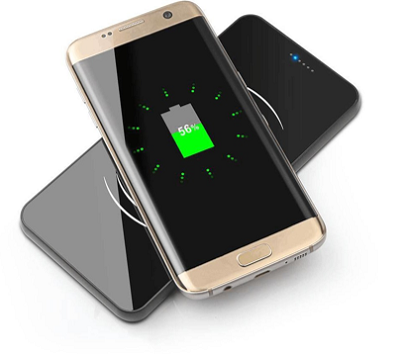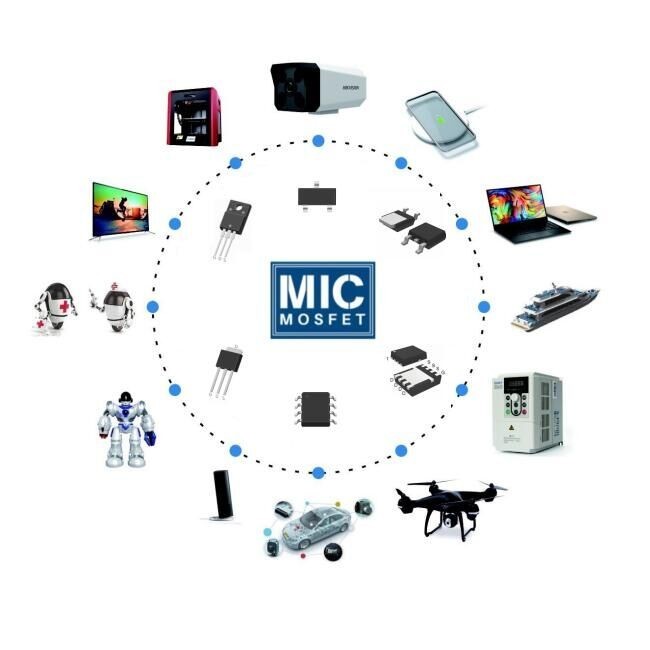Description
MOSFET TYPICAL APPLICATION: Wireless charging

| Part Number | Description | Package |
| MIC-DOS2012 | N Channel/20V/12A/12mΩ(9mΩ) | SOP-8 |
| MIC-DOS4842 | N Channel/30V/7A/23mΩ(17mΩ) | SOP-8 |
| MIC-SC012DNG | N Channel/30V/10A/12mΩ(10mΩ) | SOP-8 |
| MIC-SD032DNG | N Channel/40V/7A/32mΩ(22mΩ) | SOP-8 |
| MIC-SE040DNG | N Channel/60V/5A/40mΩ(35mΩ) | SOP-8 |
| MIC-DOS4606 | N Channel/30V、-30V/6.5A、-7A/(19mΩ、28mΩ) | SOP-8 |
| MIC-DOS4614 | N Channel/40V、-40V/6.7A、-7.2A/(22mΩ、33mΩ) | SOP-8 |
| MIC-DOS4618 | N Channel/40V、-40V/7A、-8A/(13mΩ、29mΩ) | SOP-8 |
| MIC-SC060PG | N Channel/-30V/-5A/60mΩ(50mΩ) | SOP-8 |
| MIC-ZB012DNG | N Channel/20V/12A/12mΩ(9mΩ) | DFN3*3-8 |
| MIC-ZC018DNG | N Channel/30V/20A/18mΩ(16mΩ) | DFN3*3-8 |
| MIC-ZC012DNG | N Channel/30V/30A/12mΩ(10mΩ) | DFN3*3-8 |
MOS tube of wireless charging
Wireless charging refers to the charging that is not connected to the terminal equipment that needs to be charged by using the traditional charging power line. It adopts the latest wireless charging technology. Through the use of alternating magnetic field generated between coils, the transmission of electric energy and inductive coupling technology will become a bridge connecting the charging base station and equipment. In the era of wide application of mobile phones, the development of upstream and downstream related industries has been continuously promoted, such as: Wireless charging MOS tube, USB, etc., wireless charging technology obtained 20 patents in 2007, a variety of devices can use a charging base station, and the wired charging of mobile phones, MP3 players, electric tools and other power adapters will not exist.
Physicists have long known that energy can be effectively transmitted between two objects with the same resonance frequency, while the interaction between objects with different frequencies is weak. This is why singers can shatter one bottle with different water content without affecting other bottles. It's just like when we swing, just sitting on it and letting our drooping legs swing synchronously can give the swing power. Wireless charging technology makes use of this principle. Similarly, the wireless charging technology also applies the electromagnetic wave induction principle and related AC induction technology, which uses the corresponding coil at the sending and receiving end to send and receive the induced AC signal to charge, Users only need to put the charging device on a "flat plate" to charge. Such a charging method used to appear on watches and razors, but at that time, it was unable to effectively charge large capacity lithium-ion batteries.
Originally, a British company invented a new type of wireless charging, which looks like a plastic mouse pad. The "mouse pad" is equipped with a dense array of small coils, so it can generate a magnetic field and transmit energy to the electronic equipment equipped with special receiving coils for charging. The receiving coil is made of magnetic alloy wound with wires, and its size and shape are similar to gum, so it can be easily attached to electronic equipment. The mobile phone can be charged by putting it on the pad, and can charge multiple devices at the same time. Charging technology has appeared before, but the new invention is more convenient and practical. As long as the receiving coil is pasted on the mobile phone and other devices, it can be charged at any position on the "mouse pad", unlike some previous technologies, which need precise positioning. Several devices are placed on mats at the same time, which can be charged at the same time. The magnetic field generated by the charging is very weak, which can charge the equipment but will not affect the nearby credit card, video tape and other items that use magnetic recording data.
The wireless charging system mainly adopts the principle of electromagnetic induction, and realizes the energy transfer through the coil energy coupling. As shown in the figure, when the system is working, the input terminal converts the AC mains power into DC power through the full bridge rectifier circuit, or uses the 24V DC terminal to directly supply power to the system. After the power management module, the output DC is converted into high frequency AC through 2m active crystal oscillator inverter to supply the primary winding. Through the coupling energy of two inductors, the output current of the secondary coil is changed into direct current to charge the battery.
The changing magnetic field will produce the changing electric field, and the changing electric field will produce the changing magnetic field. Its size is related to their change rate. The change rate of sine function is another sine function, so the electromagnetic wave can spread out, and the generation of induced voltage is related to the change of magnetic flux, so the changing magnetic field inside the coil will produce the induced voltage, so as to complete charging Process. Mobile phone wireless charging is a relatively new charging method, its principle is actually very simple, which is to separate the primary and secondary level of common transformer to achieve wireless purpose. Of course, the working frequency of wireless charging is relatively high, and even the role of energy transfer can be achieved by discarding the direct coil of the core.
1. Theoretically speaking, wireless charging technology is harmless to human safety. The resonance principle of wireless charging is magnetic resonance, which is only transmitted between coils with resonance at the same frequency, while other devices cannot accept the wave band. In addition, the magnetic field used by wireless charging technology itself is harmless to human body. But wireless charging technology is a new charging technology after all. For the wireless charging of maiyuan technology, many people will worry that wireless charging technology will be just like the emergence of Wi Fi and mobile phone antenna pole, in fact, the technology itself is harmless.
2. Wireless charging technology uses magnetic resonance to transmit electric energy in the electric field and magnetic field between charging and equipment, while coil and capacitor form resonance between charging and equipment.
3. This system can be widely used in the future, such as the charging area for electric vehicles and the power transmission for computer chips. The charging time needed for the charging system developed with this technology is only one-and-a-half of the current one.
4. Conversion rate has always been a concern for many people. According to research conducted by MIT, the loss of wireless charging technology is lower than that of wired charging technology. The conversion rate of wireless charging is several percentage points higher than that of wired charging. High conversion is also a key factor for wireless charging to be applied in the world. However, the wireless charging technology is also limited by the distance. In the future, it is necessary to solve the problem of precise positioning of the band and magnetic field for long-distance transmission.
5. The core chip is one of the difficulties in the application of wireless charging technology in products. Precise radiation range control, magnetic field frequency, and other controls are all realized by the chip.


